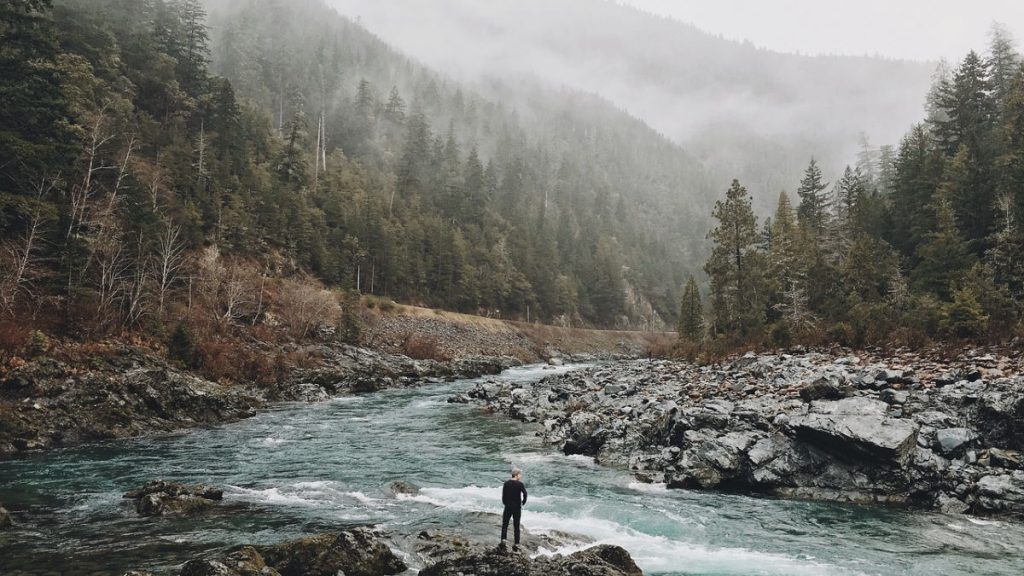[toc wrapping=”right”]
If you are a hiker, angler, or just someone who loves spending time in the woods, then you need to know how you can survive, in case you get lost in the woods. Even skilled hikers can lose their bearings in the woods and suddenly find themselves in unfamiliar territory. And you need to be adequately prepared, in case something like that happens. You need to know how to survive for hours, days or even weeks before you are rescued or find your way home. Here are some tips on how to survive in the woods, in case you get lost during your outdoor adventures.
Assess the Situation
Whether you are stuck in a dense jungle, a barren desert or a snowy mountain, you should first stop and think. Don’t try to retrace your footsteps or move further. Relax and try to calm down. It’s almost impossible to think clearly if you’ve panicked. Once you’ve calmed down, you can then begin to observe what is around you. If you have a map or a compass, you can use it to identify your location. Also, you should observe whether there are any physical landmarks that you can use to direct your rescue team when they come looking for you. If you had carried a survival kit, then you already have most of the tools you will need to survive in the woods. And if you didn’t carry one, then you have no reason to panic. You can still improvise and make use of whatever is available. Check your bag, pockets, wallet or any other storage place you might have, to see the resources that you already have. Once you’ve established what exactly you are carrying, you now need to come up with an action plan. Since you are not sure how long it will take for a rescue team to arrive, you now need to identify a water source and build a fire. After that, you should now come up with ways of establishing a shelter. Whether the rescue team will take a day or weeks to arrive, you should always plan for the long-term.
Discover a Water Source
As much as you might be the healthiest person, it will be impossible to survive without water for more than 3 days. Therefore, you need to prioritize finding a water source, if you want to survive longer in the woods when you are lost. Look for signs of lakes, rivers, creeks, ponds, as well as other freshwater sources. If there is a mountain nearby, then you should check whether water has collected at the bottom. If it’s raining, then you can use some of the containers that you have to collect rainwater. However, don’t allow the rainwater you’ve collected to stay in open containers for too long since it can attract mosquitoes and other insects – leading to contamination. You can also use a shirt, cloth, sock or any absorbent material to collect morning dew. You can also collect water by melting ice or snow. It’s highly advisable to purify all the water that you come across. Water that you collect, including ice, snow, dew or rainwater, might have bacteria, among other contaminants. And such bacteria might make you ill, thus lowering your chances of survival when lost in the wild. Boiling drinking water is one of the easiest methods for removing all sorts of contaminants. Once you boil it, allow it to sit for a while, so that the solid particles can settle at the bottom.
Build a Fire
After discovering a water source, you should then build a fire. As noted above, you need to purify the water you’ve collected, to make it safe for drinking. Also, you need to keep yourself warm, as you wait for help to arrive. You will also need to build a fire for cooking. Fire will also serve as a signal. If a rescue team comes looking for you, it will be easy to identify your position, since they simply need to follow the smoke. If you don’t have a lighter or matchsticks, then you can use some of the resources that you have to light a fire. For instance, you can direct the sun’s rays on a piece of newspaper using a magnifying glass, and if there is strong sunshine, then the newspaper will ignite. Alternatively, you can start a fire by rubbing two pieces of wood together. Once ignite the tinder, you should then blow on it gently to build the fire. After that, you can now start preparing your meals or boiling your drinking water, as you keep yourself warm.
Establish a Shelter
Creating shelter is going to make your life a bit bearable when you get lost in the wilderness. It will shield you from direct sunshine, wind, and rain, thus increasing your chances of survival significantly. The type of shelter you will build will depend on where you are, the weather conditions, as well as the tools you have in your survival kit. It’s highly advisable to build a smaller shelter, as opposed to a large one. A small shelter has better heat retention capabilities, compared to a large one. Also, if you have already prepared some food, then you need to stay it safely, away from wild animals. With a small shelter, it will be easy to keep track of all the resources that you have and keep them safe from animals. When it comes to building a shelter, you have numerous options to explore. For example, you can gather some saplings, bend them over and then tie them with vines or a rope. Once your sapling is stable, you can then cover it with sticks and branches, to create a roof. Make sure you gather as many branches and leaves as possible, to seal your shelter from water or wind. You can also use the branches and leaves to create bedding.
Look for Food
After you’ve identified a water source, built a fire and established a shelter, you should now look for food that can sustain you until help arrives. Some of the emergency food options that you can consider include snakes, crawfish, frogs, grubs as well as small animals such as squirrels and rabbits. You should also collect some wild fruits and berries. However, you need to know that some wild berries are poisonous. Avoid white berries, since most of them tend to be toxic to humans. Never consume wild mushrooms, regardless of how hungry you are. Insects are also readily available. You can find termites, beetles, and ants under stones and logs. Insects that have hard outer shells such as grasshoppers and beetles tend to be infested with parasites. Therefore, make sure you cook them for at least five minutes before eating them, to kill those parasites. Some wild plants such as wood sorrel, chickweed and dandelion are also edible. Ensure you wash off all the wild plants that you collect prior to eating them. Avoid trying to hunt large animals, since you might end up injuring yourself, especially if you don’t have the right hunting tools. Also, you don’t have the equipment needed to preserve large amounts of meat. Within a day or two, the meat will start rotting, making your shelter unbearable to live in. Rotting meat might also attract animals such as hyenas, thus putting your life in danger. As a rule, never eat anything that you are not sure about.
Survival Tools
Your survival when you are lost in the wilderness will depend on how fast you can find a water source and something to eat, build a fire, and establish a shelter. Therefore, you will need some tools to help you with all these activities. And this is where survival tools come in. Some of the tools you might need include a knife, water purifier, fire starter, a map and compass, a watch, and a first aid kit with portable medical supplies, among others. The map and compass will help you to identify your exact location. You can then send your rescue those coordinates, making it easy for them to find you. If you don’t have any of those, then you can direct them using notable landmarks near you. A watch, on the other hand, will help you to tell time. Some military watches come equipped with GPS technology. Even if you lose your map or compass, then you can rely on your watch to tell your coordinates. And if you get injured, then a first aid kit will help you to treat those minor injuries, before you can seek further medical attention. If you don’t have any of these tools, then you need to utilize whatever is available.
Closing Remarks
Once it’s clear that you are lost in the wilderness, you need to remain cool, think clearly and then assess the situation. After that, you need to get drinking water, build a fire, find some food, and establish shelter, within the shortest time possible. As long as you maintain a positive attitude and be ready to adapt, help will eventually come, regardless of how long it takes.
[jbio template=”bootbomb0″]




0 comments